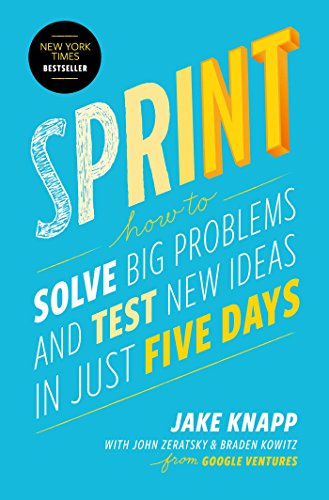 Reddit reviews Sprint: How to Solve Big Problems and Test New Ideas in Just Five Days
Reddit reviews Sprint: How to Solve Big Problems and Test New Ideas in Just Five Days
We found 11 Reddit comments about Sprint: How to Solve Big Problems and Test New Ideas in Just Five Days. Here are the top ones, ranked by their Reddit score.

Sprint How to Solve Big Problems and Test New Ideas in Just Five Days
My advice is to follow 3 tracks.
----
These are things that led me to where I am today. Others may have completely different or contradictory advice. But these are my go to methods. And most of my clients in the past 2 years have come to me. I didn't call them, or post an ad. Generally they found me through a recommendation from a friend, LinkedIn, Twitter, slack group, Dribbble, or at a meeting.
If you are going for a internet business or any product-oriented business here a are the best books
BEST ONES
"The Lean Startup: How Today's Entrepreneurs Use Continuous Innovation to Create Radically Successful Businesses" (Eric Reis) - 2011
https://www.amazon.com/Lean-Startup-Entrepreneurs-Continuous-Innovation/dp/0307887898/
"Running Lean: Iterate from Plan A to a Plan That Works" (Ash Maurya) - 2010
https://www.amazon.com/Running-Lean-Iterate-Plan-Works/dp/1449305172
"Sprint: How to Solve Big Problems and Test New Ideas in Just Five Days" (Jake Knapp - Google Ventures) - 2016
https://www.amazon.com/Sprint-Solve-Problems-Test-Ideas/dp/150112174X/ref=sr_1_1?qid=1550802301&s=gateway&sr=8-1
​
ALSO GO FOR (these are the ones that started organizing the Startup world)
"The Four Steps to the Epiphany" (Steve Blank) - 2005
https://www.amazon.com/gp/product/0989200507/
"Business Model Generation" (Alexander Osterwalder) - 2008
https://www.amazon.com/Business-Model-Generation-Visionaries-Challengers/dp/0470876417/
I've talked with more than 100 companies (startups, dev/design shops, and enterprise cos) about how they do user research/testing (even started working on a startup related to it). There are 2 types of companies:
The companies who do it best right now have week long sprints where the last couple of days (or early days the following week) are dedicated to testing with users. Jake Knapp at Google Ventures wrote an awesome how-to (http://www.amazon.com/Sprint-Solve-Problems-Test-Ideas/dp/150112174X).
Basically the summary of my research is this: either dedicate a day or two exclusively to talking to users, or its not going to be a part of the process.
There is a fascinating book called "Sprint" that was written by two of the heads of Google Ventures that talks about this little robot and how they worked with this startup to come up with the cute "yaye" noise. It's a really cool read.
Here are a few:
Elements of User Experience, Jesse James Garret: What a typical experience design process is made up of.
Designing Interactions, Bill Moggridge: Seminal thoughts on Interaction Design, holds up to this day
Don't Make Me Think, Steve Krug: One of the first books to gave the issues of IA and UX design a human, customer point of view.
About Face, Alan Cooper: Another take on the whole process, dives a bit deeper into every stage than Garret's book.
Designing For The Digital Age, Kim Goodwin: Human-centered digital products
Sprint, Jake Knapp: A condensed prototyping methodology
100 Things To Know About People, Susan Weinschenk: How people think
There are a few more Product Design related books I recommended in another thread.
IDEO's design thinking methodologies are also a great resource:
Design Kit, A book and toolkit about human centered design
Circular Design, A guide for holistic design, organization friendly.
Cheers
I'm not a UX designer, but I have a psych background and have dabbled in UX as a business owner/developer.
As others have mentioned, it can definitely be a good fit. A psych education will help you more intuitively understand the cognitive and emotional processes that users go through when interacting with a product, and it also gives you a leg up on the research side.
A UX designer that I worked with recommended reading up on Google's design methodology. Specifically, he recommended the book Sprint which outlines their framework in detail.
You are providing no specifics. None. Just what you aspire to your toy to do. I can't give you feedback on your aspirations, half the toys on the market spout aspirations about teaching children valuable things.
​
\>Since most adults are clueless on what profession, career, calling to pursue. Your children will have a taste of it when they are young so they'll be able to figure out which one is for them.
This is utter BS. Playing with a toy focused around a career teaches you nothing about what that career is like.
Build a prototype, go test it with potential customers. Check out Sprint: How to Solve Big Problems and Test New Ideas in Just Five Days.
Check out;
This book really is great and helped me to create a startup in 24 hours. Below is my startup;
It really gets you to think of speed and tests your idea without investing too much into something that might not work.
Ideally, management will be learnt on the way and shouldn't be too much of the focus when starting up a business. You need to focus on getting your product out to the market asap and prove your business model works. From this point, everything else will follow.
I hope this book helps you out and wish you all the best of luck! Let me know if you need any other advise.
I'd second all these and add
The robot is very similar to the one mentioned in Sprint: How to solve big problems and test new ideas which was backed by Google Ventures
I'd recommend reading the book Sprint by Jake Knapp. He developed a super cost and time efficient method for startups to see if there is in fact a demand for their product before dumping tons of money into it. Check it out -> Sprint: How to Solve Big Problems and Test New Ideas in Just Five Days https://www.amazon.com/dp/150112174X/ref=cm_sw_r_cp_api_urQAxbAD06ZS6